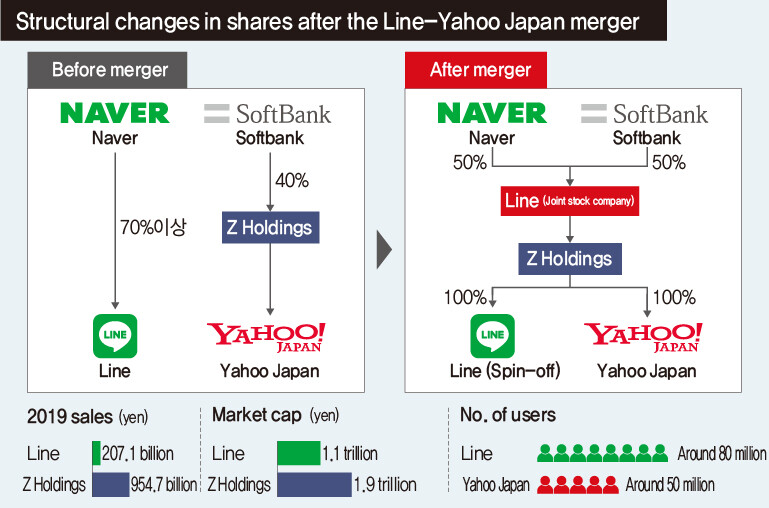hankyoreh
Links to other country sites 다른 나라 사이트 링크
Japan’s antitrust regulators review merger of Yahoo Japan and Line

Japan’s Fair Trade Commission (FTC) completed an antitrust review of the planned corporate integration of Japanese messaging app Line Corp. and internet portal Yahoo Japan Corp. on Aug. 4. South Korea's largest internet portal Naver means to fully spin off Line by 2021.
In a progress report released on Aug. 4, Naver said that regulators conducting a global antitrust review of the business integration of its affiliate Line with Z Holdings, a Softbank affiliate that runs Yahoo Japan, had fully approved the plan. Regulators concluded that the two companies’ integration will not undermine competition or damage consumers.
Naver and Softbank are moving forward with a plan to turn Z Holdings into an integrated holding company for Yahoo Japan and Line by mounting a takeover bid for the entirety of Line stock. “We’ve decided to have our Japanese affiliate Naver J. Hub acquire half of Line’s equity in a takeover bid that will run through Sept. 15,” Naver announced.
If the two companies are unable to acquire all of Line’s stock in the takeover bid, they’ll use a reverse stock split to turn Line into a company fully owned by Naver and Softbank and then have Line’s stock delisted. Naver and Softbank have a 50-50 stake in Z Holdings, which controls Line and Yahoo Japan.
The timeframe for deciding on Line’s corporate spinoff from Naver has been delayed from this September until next February. “We’ve rescheduled the spinoff, which is part of the business integration, because of the impact of COVID-19,” a Naver spokesperson explained.
Naver and Softbank signed a memorandum of understanding (MOU) about the business integration on Nov. 18, 2019. These two rivals in the mobile-based payment market in Japan have joined forces with the goal of surpassing global IT behemoths such as Google, Facebook, and Tencent. “Foreign companies that are based in the US and China are dominating the Internet service market,” the two companies explained.
By Choi Min-young, staff reporter
Please direct comments or questions to [english@hani.co.kr]

Editorial・opinion
![[Column] Park Geun-hye déjà vu in Yoon Suk-yeol [Column] Park Geun-hye déjà vu in Yoon Suk-yeol](https://flexible.img.hani.co.kr/flexible/normal/500/300/imgdb/original/2024/0424/651713945113788.jpg) [Column] Park Geun-hye déjà vu in Yoon Suk-yeol
[Column] Park Geun-hye déjà vu in Yoon Suk-yeol![[Editorial] New weight of N. Korea’s nuclear threats makes dialogue all the more urgent [Editorial] New weight of N. Korea’s nuclear threats makes dialogue all the more urgent](https://flexible.img.hani.co.kr/flexible/normal/500/300/imgdb/original/2024/0424/7317139454662664.jpg) [Editorial] New weight of N. Korea’s nuclear threats makes dialogue all the more urgent
[Editorial] New weight of N. Korea’s nuclear threats makes dialogue all the more urgent- [Guest essay] The real reason Korea’s new right wants to dub Rhee a founding father
- [Column] ‘Choson’: Is it time we start referring to N. Korea in its own terms?
- [Editorial] Japan’s rewriting of history with Korea has gone too far
- [Column] The president’s questionable capacity for dialogue
- [Column] Are chaebol firms just pizza pies for families to divvy up as they please?
- [Column] Has Korea, too, crossed the Rubicon on China?
- [Correspondent’s column] In Japan’s alliance with US, echoes of its past alliances with UK
- [Editorial] Does Yoon think the Korean public is wrong?
Most viewed articles
- 1‘We must say no’: Seoul defense chief on Korean, USFK involvement in hypothetical Taiwan crisis
- 2[Reportage] On US campuses, student risk arrest as they call for divestment from Israel
- 3[Column] Park Geun-hye déjà vu in Yoon Suk-yeol
- 4‘Weddingflation’ breaks the bank for Korean couples-to-be
- 5Korea sees more deaths than births for 52nd consecutive month in February
- 6N. Korean delegation’s trip to Iran shows how Pyongyang is leveraging ties with Moscow
- 7Amnesty notes ‘erosion’ of freedom of expression in Korea in annual human rights report
- 8Will NewJeans end up collateral damage in internal feud at K-pop juggernaut Hybe?
- 9N. Korean hackers breached 10 defense contractors in South for months, police say
- 10[Guest essay] The real reason Korea’s new right wants to dub Rhee a founding father